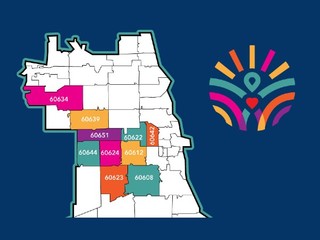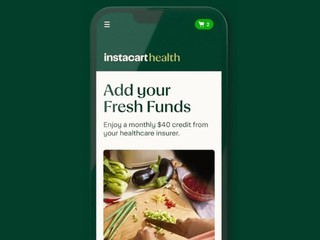
DispatchHealth and Instacart Health partner to stop food insecurity
DispatchHealth's in-home providers will use Instacart's technology to prescribe food interventions
 Since Instacart debuted Instacart Health, its initiative to promote nutrition and food access, in late 2022, the company has been on a tear, entering into multiple partnerships including with Wellness West, Partnership for a Healthier America, and the Biden administration. The goal is to help end food insecurity and hunger, which affects over 10% of households in the United States, or 33.8 million people.
Since Instacart debuted Instacart Health, its initiative to promote nutrition and food access, in late 2022, the company has been on a tear, entering into multiple partnerships including with Wellness West, Partnership for a Healthier America, and the Biden administration. The goal is to help end food insecurity and hunger, which affects over 10% of households in the United States, or 33.8 million people.
Its latest collaboration is with DispatchHealth, an in-home, high acuity medical care provider: on Tuesday the two companies announced that they were teaming up in a partnership that will will allow DispatchHealth's in-home providers to use Instacart Health technology to prescribe food interventions.
DispatchHealth's medical professionals will be able to to allocate digital, category-specific food stipends to patients using Fresh Funds, a program through which organizations can provide funds for people to buy nutritious food from grocery retailers on the Instacart App. They will also be able to offer patients medically tailored shopping lists through customized Virtual Storefronts, and send food directly to patients' doorsteps through Care Carts, which are designed to give healthcare providers and caregivers the ability to order groceries on behalf of someone else.
Founded in 2013, DispatchHealth is an in-home care, on-demand care company. Two providers arrive at the patient's home, including a physician assistant or nurse practitioner, and a DispatchHealth medical technician. An ER physician is always available by phone for consults as well.The company can treat nearly every non-life-threatening medical condition that can be treated in an urgent care center or other health care facility, including urinary tract infections, respiratory infections, fall injuries, flu, migraines, dehydration, and stitches.
DispatchHealth is in-network with most insurance plans, including Anthem, UnitedHealthcare, Aetna, Cigna, Humana, Bright Health, Mercy Care, InnovAge, CareMore Health, Optima Health, UMR, and AARP.
Since the company's inception in 2013, its expert medical teams have treated more than one million people in their homes across more than 30 states in the country. The company says this has resulted in 58% emergency room avoidance, 8.5% 30-day hospital readmission, 98% patient satisfaction, and nearly $1.5 billion in medical cost savings.
Along with Fresh Funds and Care Cart, Instacart also launched Health Tags, which let customers view up to 23 item-level labels, including low-salt, low-sugar, keto, gluten-free, while they shop on Instacart, as part of Instacart Health.
The company also unveiled its Instacart Health Policy Agenda, which outlines the company’s top three policy priorities and new advocacy commitments to help expand access to nutritious food and improve health outcomes. That will involve working with policymakers, researchers, nonprofit leaders, private sector partners, and others to help shape and enact policies at the federal, state, and local level with the aim of modernizing food assistance programs to increase equitable access to nutritious food; increasing the availability of affordable, nutritious food in underserved urban and rural areas; and providing equitable access to health-tailored groceries and food prescription programs.
"Our patients' well-being is closely tied to their environment, and we witness firsthand how social determinants like nutritional accessibility affect their overall health. We are literally in the kitchen with our patients and not many provider groups can get to that level of granularity," DispatchHealth Chief Medical Officer Dr. Phil Mitchell said in a statement.
"Our collaboration with Instacart empowers us to bridge these gaps and bring about tangible improvements in our patients' lives."
Related News


Instacart and Wellness West team up on Chicago-based food program



